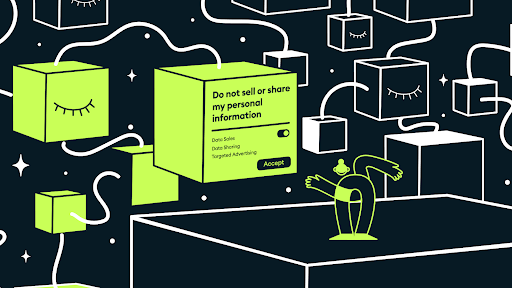The data economy is changing. Here’s how brands need to adapt to keep up.
When British mathematician Clive Humby declared in 2006 that “data is the new oil,” he meant that data, like oil, isn’t useful in its raw state. It needs to be refined, processed, and turned into something useful; its value lies in its potential.
But over the past 16 years, Humby’s insight has devolved into a cliché, losing much of its meaning. Many businesses learned the wrong lesson, viewing data as inherently valuable – something to be simply extracted, amassed, and used or abused.
Regulators have responded in kind, viewing data – like oil – as a disaster waiting to happen, and themselves as the thin red line standing in the way of catastrophe. The result: a race to the bottom, with brands vying to maximize data collection, regulators seeking to make examples of bad actors, and consumers caught in the crossfire.
As we look to the evolving data economy, we need a new guiding metaphor: a way of thinking about data that focuses less on exploiting a resource and more on building equitable and sustainable relationships with consumers, customers, guests, visitors – ultimately people. The reality is that data isn’t a resource to be passively extracted from consumers – it’s more like a currency that consumers actively invest in to unlock specific benefits and experiences.
The past three decades of data-management innovation have focused on amassing data, but now the focus has shifted to unlocking mutual value for companies and customers. As marketers, we’re uniquely positioned to lead that charge because building exceptional experiences and enabling responsible, mutually beneficial data use starts with listening to and empowering the people that buy our products and services.

Consumers are leading the way
That might sound odd: we’re used to thinking of consumers as relatively naive when it comes to data. But research shows that consumers have a more sophisticated understanding of the data economy than brands or regulators typically give them credit for.
If Cambridge Analytica was a wake-up call, alerting consumers to how their data was being collected and used, subsequent scandals have given consumers a much broader awareness of just how much is at stake. In a post-Dobbs world, the true power of everything from geolocation data to health data from period-tracking apps is now starkly apparent to consumers.
That doesn’t mean people understand the mechanics of data collection and processing or the small print of privacy regulations. Some haven’t heard of the GDPR or California’s new privacy laws; of those who have, it’s unlikely that all but a few can explain how modern privacy legislation works in practice.
What most people do understand, though, is that their data is valuable because it is potent – and can be used both for good and for ill. According to media investment consulting firm Magna Global research, three-quarters of consumers care deeply about their data privacy. That’s fairly remarkable, considering only about half of consumers feel so strongly about sustainability or diversity, according to that same research.
Magna Global also found that more than four-fifths worry about how companies use their data, but 83% are nonetheless willing to share data to access benefits such as discounted or personalized services.

Magna Global + Ketch research found 83% of people see the value in sharing their data with brands
In other words, while brands are stuck in an extractive mindset, consumers increasingly view data-sharing as a negotiated exchange of value. They tend to understand the risks involved and are unlikely to give their data away for no reason. But when companies earn their trust and offer meaningful value in return, they’ll be more willing to share their data on mutually beneficial terms.
Marketers need to step up
In recent years, companies have refined their messaging and taken concrete actions to align with customers’ values in sustainability and inclusion. Now it’s time for a similar revolution in the way we think, talk and act about data.
Consumers are telling us loudly and clearly that they will no longer accept a passive role in the data economy, with companies extracting and exploiting their data. Instead, consumers want agency over how their data is used – real, ongoing control over a transparent exchange of value, rather than superficial one-time “consent” used as a figleaf for extractive data policies.
This isn’t a passing trend. Research has suggested that the younger a consumer is, the more likely they are to share data with brands – not because they are naive, but because they are more attuned to the exchange of value that’s taking place. Gen Z consumers seem to be especially likely to configure data preferences when interacting with brands or to file data deletion requests – a clear sign of the direction in which consumer expectations are moving.
For younger consumers, data sharing is a reality – but so is data control. It is imperative that brands keep pace by embracing responsible data practices and implementing the controls that consumers are increasingly demanding.

Brands must embrace responsible data practices and implement the controls that consumers are increasingly demanding
That starts with delivering meaningful end-to-end control over how data is collected, stored, and used.
One-time consent banners and incomprehensible copy about privacy policies won’t cut it: we need intelligent whole-lifecycle controls that let consumers decide exactly how their data can be used, with rigorous enforcement across the entire data ecosystem. Permission-based infrastructure must permeate the tech stack, ensuring that data is only ever used in ways that consumers have explicitly approved.
Brands will need to leverage these capabilities to realign with consumer values. Instead of narrow, legalistic compliance with whatever new regulations are implemented, organizations need to be more proactive – by empowering consumers, meeting and exceeding their expectations, and cementing their position as trusted partners in an ongoing exchange of value.

What comes next?
Brands that stick to extractive models will keep clashing with regulators, degrading the consumer experience and eroding their credibility, reputations, and commercial success. Over time, their data sources will dry up, and consumers will simply no longer be willing to engage with them.
On the other hand, companies that invest in data infrastructure grounded in trust and respect will be rewarded. Research shows that both purchase intent and brand loyalty increase when companies use responsible data practices, and that consumers are also far more willing to entrust their data to responsible companies.
In other words, the more we approach data collection as a mutual exchange of value, rather than a one-way extractive process, the more consumers will willingly entrust us with the high-quality data we need to grow our businesses. Brands that lean into this transformation have an unprecedented opportunity to forge lasting alignment with customers – and unlock the full potential of the new data economy.
Put yourself in first place 🥇
Differentiation is critical. In today's job market, interview processes have four, five or even more stages. Competition is fierce, and proving your worth is getting harder.
How valuable would it be to you to be able to bypass all that in the eyes of the recruiter, because they’re already familiar with your work?
We're offering you the means to do just that.
We’ll work with you to quickly adapt your work into SEO-optimized articles, ghostwritten guides, and podcast episodes.
It’s never been easier to differentiate yourself, so why not start today?
Sound interesting? Send us a message at contribute@competitiveintelligencealliance.io to discuss next steps. 🤝





.png?v=4fd2470976)